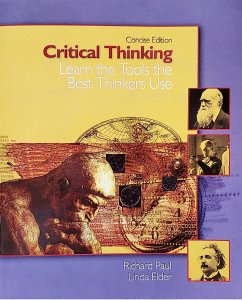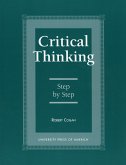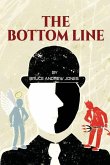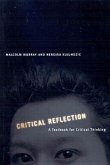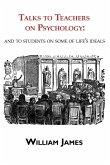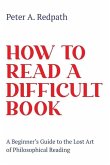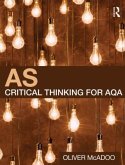- Broschiertes Buch
- Merkliste
- Auf die Merkliste
- Bewerten Bewerten
- Teilen
- Produkt teilen
- Produkterinnerung
- Produkterinnerung
Now available from Rowman & Littlefield, Paul and Elder's concise introductory text focuses on the most basic critical thinking concepts and includes activities to apply these concepts within disciplines and to life
Andere Kunden interessierten sich auch für
![Critical Thinking Critical Thinking]() Robert CoganCritical Thinking95,99 €
Robert CoganCritical Thinking95,99 €![The Bottom Line The Bottom Line]() Bruce JonesThe Bottom Line16,99 €
Bruce JonesThe Bottom Line16,99 €![Critical Reflection: A Textbook for Critical Thinking Critical Reflection: A Textbook for Critical Thinking]() Malcolm MurrayCritical Reflection: A Textbook for Critical Thinking34,99 €
Malcolm MurrayCritical Reflection: A Textbook for Critical Thinking34,99 €![Talks to Teachers on Psychology Talks to Teachers on Psychology]() William JamesTalks to Teachers on Psychology11,99 €
William JamesTalks to Teachers on Psychology11,99 €![How to Read a Difficult Book How to Read a Difficult Book]() Peter A RedpathHow to Read a Difficult Book15,99 €
Peter A RedpathHow to Read a Difficult Book15,99 €![AS Critical Thinking for AQA AS Critical Thinking for AQA]() Oliver McAdooAS Critical Thinking for AQA55,99 €
Oliver McAdooAS Critical Thinking for AQA55,99 €![Wholesome Is Our Precious Gender Divide Wholesome Is Our Precious Gender Divide]() Alexander BarrieWholesome Is Our Precious Gender Divide12,99 €
Alexander BarrieWholesome Is Our Precious Gender Divide12,99 €-
-
-
Now available from Rowman & Littlefield, Paul and Elder's concise introductory text focuses on the most basic critical thinking concepts and includes activities to apply these concepts within disciplines and to life
Produktdetails
- Produktdetails
- Verlag: Globe Pequot Publishing Group Inc/Bloomsbury
- Concise edition
- Seitenzahl: 370
- Erscheinungstermin: 23. September 2013
- Englisch
- Abmessung: 234mm x 196mm x 20mm
- Gewicht: 576g
- ISBN-13: 9781538139509
- ISBN-10: 1538139502
- Artikelnr.: 62318176
- Herstellerkennzeichnung
- Libri GmbH
- Europaallee 1
- 36244 Bad Hersfeld
- gpsr@libri.de
- Verlag: Globe Pequot Publishing Group Inc/Bloomsbury
- Concise edition
- Seitenzahl: 370
- Erscheinungstermin: 23. September 2013
- Englisch
- Abmessung: 234mm x 196mm x 20mm
- Gewicht: 576g
- ISBN-13: 9781538139509
- ISBN-10: 1538139502
- Artikelnr.: 62318176
- Herstellerkennzeichnung
- Libri GmbH
- Europaallee 1
- 36244 Bad Hersfeld
- gpsr@libri.de
Dr. Linda Elder is an educational psychologist who has taught both psychology and critical thinking at the college level. She has been President of the Foundation for Critical Thinking and the Executive Director of the Center for Critical Thinking for almost 25 years. She has a special interest in the relation of thought and emotion, as well as the cognitive and affective. She has developed an original theory of the stages of critical thinking development. Elder has coauthored four books on critical thinking, as well as all 23 titles found in the Thinker's Guide Library. Dr. Richard Paul was a leading proponent of critical thinking and through his work and legacy remains an international authority in the field. He founded the Center for Critical Thinking at Sonoma State University in 1980, followed by the Foundation for Critical Thinking. He developed concepts, principles, and theory essentials to a robust and fairminded conception of critical thinking and authored more than 200 articles and seven books on the topic. He presented workshops to hundreds of thousands of educators over his 35-year career as a leader in the critical thinking movement.
Introduction: A Start-up Definition of Critical Thinking.
1. How the Mind Can Discover Itself
2. Discover The Parts of Thinking
3. Discover Universal Standards for Thinking
4. Redefining Grades as Levels of Thinking and Learning
5. Learn to Ask the Questions the Best Thinkers Ask
6. Discover How the Best Thinkers Learn
7. Learn How to Read Closely and Write Substantively
Part I: Discover Close Reading
Part II: Discover Substantive Writing
Part III: Practice Close Reading and Substantive Writing
8. Become a Fairminded Thinker
9. Deal with Your Irrational Mind
Part I: The Best Thinkers Take Charge of Their Egocentric Nature
Part II: The Best Thinkers Take Charge of Their Sociocentric Thinking
10. The Stages of Critical Thinking Development: At What Stage Are You?
Appendix A: Further Exercises in Close Reading and Substantive Writing
Appendix B: Sample Analyses of "The Logic of . . ."
Appendix C: What We Mean By "The Best Thinkers?"
Glossary
1. How the Mind Can Discover Itself
2. Discover The Parts of Thinking
3. Discover Universal Standards for Thinking
4. Redefining Grades as Levels of Thinking and Learning
5. Learn to Ask the Questions the Best Thinkers Ask
6. Discover How the Best Thinkers Learn
7. Learn How to Read Closely and Write Substantively
Part I: Discover Close Reading
Part II: Discover Substantive Writing
Part III: Practice Close Reading and Substantive Writing
8. Become a Fairminded Thinker
9. Deal with Your Irrational Mind
Part I: The Best Thinkers Take Charge of Their Egocentric Nature
Part II: The Best Thinkers Take Charge of Their Sociocentric Thinking
10. The Stages of Critical Thinking Development: At What Stage Are You?
Appendix A: Further Exercises in Close Reading and Substantive Writing
Appendix B: Sample Analyses of "The Logic of . . ."
Appendix C: What We Mean By "The Best Thinkers?"
Glossary
Introduction: A Start-up Definition of Critical Thinking.
1. How the Mind Can Discover Itself
2. Discover The Parts of Thinking
3. Discover Universal Standards for Thinking
4. Redefining Grades as Levels of Thinking and Learning
5. Learn to Ask the Questions the Best Thinkers Ask
6. Discover How the Best Thinkers Learn
7. Learn How to Read Closely and Write Substantively
Part I: Discover Close Reading
Part II: Discover Substantive Writing
Part III: Practice Close Reading and Substantive Writing
8. Become a Fairminded Thinker
9. Deal with Your Irrational Mind
Part I: The Best Thinkers Take Charge of Their Egocentric Nature
Part II: The Best Thinkers Take Charge of Their Sociocentric Thinking
10. The Stages of Critical Thinking Development: At What Stage Are You?
Appendix A: Further Exercises in Close Reading and Substantive Writing
Appendix B: Sample Analyses of "The Logic of . . ."
Appendix C: What We Mean By "The Best Thinkers?"
Glossary
1. How the Mind Can Discover Itself
2. Discover The Parts of Thinking
3. Discover Universal Standards for Thinking
4. Redefining Grades as Levels of Thinking and Learning
5. Learn to Ask the Questions the Best Thinkers Ask
6. Discover How the Best Thinkers Learn
7. Learn How to Read Closely and Write Substantively
Part I: Discover Close Reading
Part II: Discover Substantive Writing
Part III: Practice Close Reading and Substantive Writing
8. Become a Fairminded Thinker
9. Deal with Your Irrational Mind
Part I: The Best Thinkers Take Charge of Their Egocentric Nature
Part II: The Best Thinkers Take Charge of Their Sociocentric Thinking
10. The Stages of Critical Thinking Development: At What Stage Are You?
Appendix A: Further Exercises in Close Reading and Substantive Writing
Appendix B: Sample Analyses of "The Logic of . . ."
Appendix C: What We Mean By "The Best Thinkers?"
Glossary

